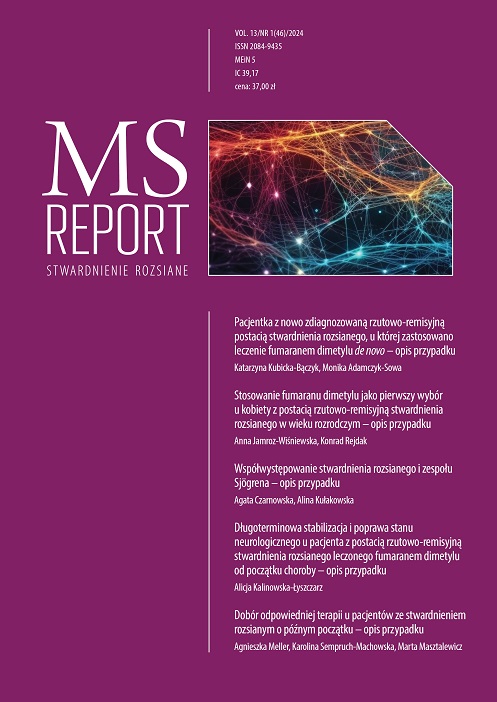Dimethyl fumarate in the treatment of relapsing-remitting multiple sclerosis – case report Case report
Main Article Content
Abstract
This case report presented the history of a currently 38-year-old woman who was diagnosed with relapsing-remitting multiple sclerosis 15 years ago. At that time, brain magnetic resonance imaging revealed demyelinating lesions supra- and infratentorially, and oligoclonal bands were detected in the cerebrospinal fluid. The patient decided to initiate disease-modifying therapy only in 2018 after a severe cerebellospinal relapse, when dimethyl fumarate treatment was introduced within NFZ drug program. Within 5 consecutive years, the patient achieved NEDA-3 status (no new relapses, no new demyelinating lesions in annual brain magnetic resonance imaging and no signs of disability progression in EDSS scale). In the context of this case report, selected aspects of relapsing-remitting multiple sclerosis treatment with dimethyl fumarate were presented, with particular emphasis on prognostic profile of the disease course and reproductive issues.
Article Details
Copyright © by Medical Education. All rights reserved.
References
2. Rotstein D, Montalban X. Reaching an evidence-based prognosis for personalized treatment of multiple sclerosis. Nat Rev Neurol. 2019; 15: 287-300.
3. Buron MD, Chalmer TA, Sellebjerg F et al. Comparative effectiveness of teriflunomide and dimethyl fumarate. Neurology. 2019; 92: e1811-20.
4. Braune S, Grimm S, van Hövell P et al. Comparative effectiveness of delayed-release dimethyl fumarate versus interferon, glatiramer acetate, teriflunomide, or fingolimod: results from the German NeuroTransData registry. J Neurol. 2018; 265: 2980-92.
5. Gold R, Arnold DL, Bar-Or A et al. Long-term safety and efficacy of dimethyl fumarate for up to 13 years in patients with relapsing-remitting multiple sclerosis: Final ENDORSE study results. Mult Scler J. 2022; 28: 801-16.
6. Spelman T, Magyari M, Piehl F et al. Treatment Escalation vs Immediate Initiation of Highly Effective Treatment for Patients With Relapsing-Remitting Multiple Sclerosis. JAMA Neurol. 2021; 78: 1197.
7. Iaffaldano P, Lucisano G, Caputo F et al. Long-term disability trajectories in relapsing multiple sclerosis patients treated with early intensive or escalation treatment strategies. Ther Adv Neurol Disord. 2021; 14: 175628642110195.
8. Giovannoni G, Butzkueven H, Dhib-Jalbut S et al. Brain health: time matters in multiple sclerosis. Mult Scler Relat Disord. 2016; 9: S5-48.
9. Nakamura K, Mokliatchouk O, Arnold DL et al. Effects of Dimethyl Fumarate on Brain Atrophy in Relapsing-Remitting Multiple Sclerosis: Pooled Analysis Phase 3 DEFINE and CONFIRM Studies. Front Neurol. 2022; 13: 809273.
10. Marastoni D, Crescenzo F, Pisani AI et al. Two years’ effect of dimethyl fumarate on focal and diffuse gray matter pathology in multiple sclerosis. Mult Scler J. 2022; 28: 2090-8.
11. Chylińska M, Komendziński J, Wyszomirski A et al. Brain Atrophy as an Outcome of Disease-Modifying Therapy for Remitting-Relapsing Multiple Sclerosis. Mult Scler Int. 2023; 2023: 4130557.
12. Carlomagno V, Mirabella M, Lucchini M. Current Status of Oral Disease-Modifying Treatment Effects on Cognitive Outcomes in Multiple Sclerosis: A Scoping Review. Bioengineering. 2023; 10: 848.
13. Alvarez E, Nair KV, Hoyt BD et al. Brain atrophy rates in patients with multiple sclerosis on long term natalizumab resembles healthy controls. Mult Scler Relat Disord. 2021; 55: 103170.
14. Houtchens MK, Edwards NC, Schneider G et al. Pregnancy rates and outcomes in women with and without MS in the United States. Neurology. 2018; 91: e1559-e1569.
15. Andersen JB, Sellebjerg F, Magyari M. Pregnancy outcomes after early fetal exposure to injectable first-line treatments, dimethyl fumarate, or natalizumab in Danish women with multiple sclerosis. Eur J Neurol. 2023; 30: 162-71.
16. Hellwig K, Rog D, McGuigan C et al. Interim Analysis of Pregnancy Outcomes After Exposure to Dimethyl Fumarate in a Prospective International Registry. Neurol Neuroimmunol Neuroinflammation. 2022; 9: e1114.
17. Hemmer B. Diagnose und Therapie der Multiplen Sklerose, Neuromyelitis-opticaSpektrum-Erkrankungen und MOG-IgG-assoziierten Erkrankungen. Leitlinien für Diagnostik und Ther der Neurol Deutsch Gesellschaft für Neurol. 2023; AWMF-Registernummer: 030/050.
18. Montalban X. Update of the ECTRIMS/EAN Guidelines on the Treatment of Multiple Sclerosis. Updated recommendations. ECTRIMS Congress, 2021.
19. Dobson R, Rog D, Ovadia C et al. Anti-CD20 therapies in pregnancy and breast feeding: a review and ABN guidelines. Pract Neurol. 2023; 23: 6-14.
20. Farber RS, Sand IK. Optimizing the initial choice and timing of therapy in relapsing-remitting multiple sclerosis. Ther Adv Neurol Disord. 2015; 8: 212-32.
21. Mowry E. PS01.01 – Escalation Versus Aggressive Treatment Algorithms. ECTRIMS Congress, 2020.
22. Giovannoni G. PS09.01 – Customized Management of Individuals with MS Using Approved Therapies. ECTRIMS Congress, 2020.
23. Baldassari L, Cohen J. Chapter 11. Approach to Disease Modifying Therapy. In: Multiple Sclerosis and Related Disorders, Second Edition. 2019.

